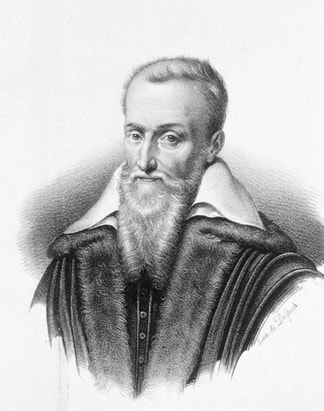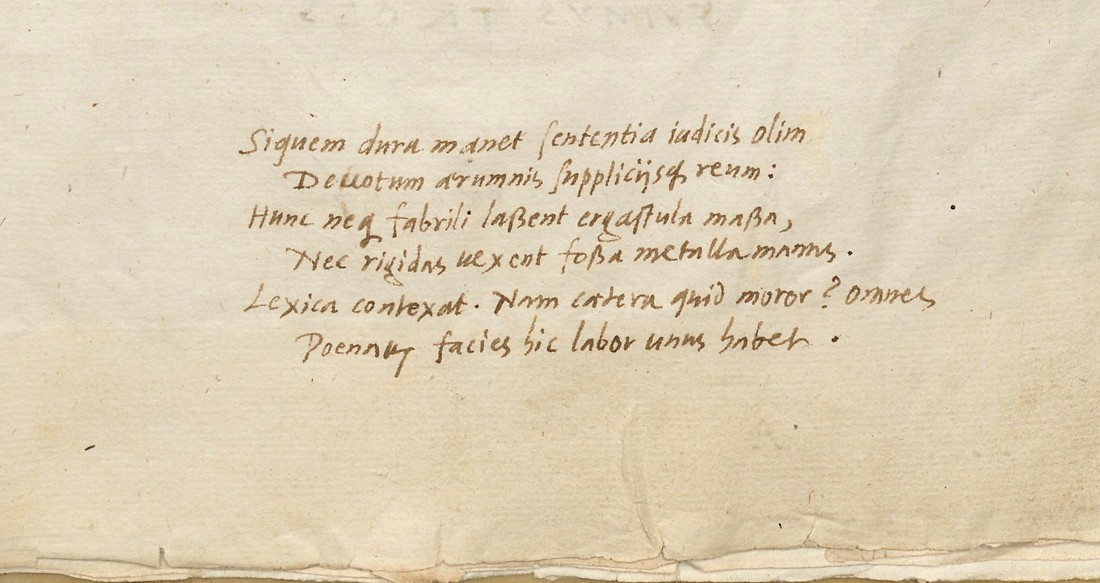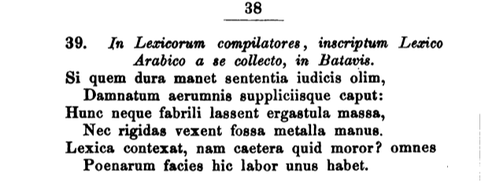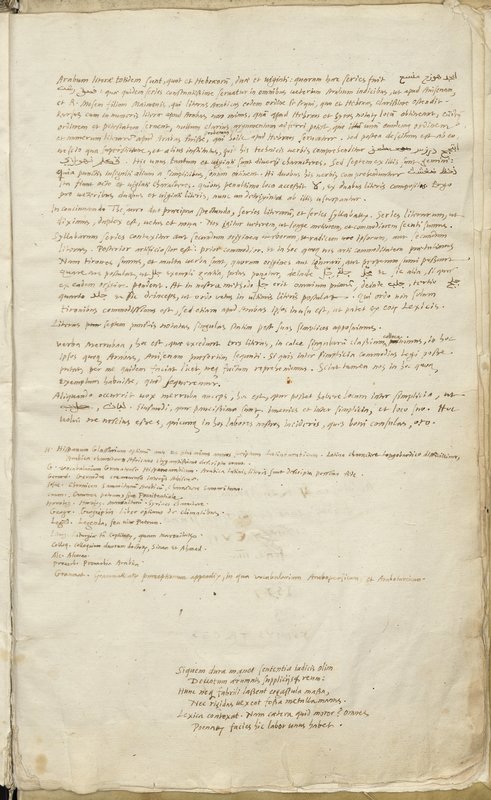
Authority Cited: Scaliger
Author name and dates: Joseph Justinian (or Justus) Scaliger (1540-1609)
BKG Bio-tweet: Paris/Leiden scholar; European travels; converted to Protestant; extended classical studies to Mideast; SJ cites in etym, Preface
Categories (list of works cited – preliminary) [BKG Note: three Scaliger cites for etymologies in 1755 Dict. vol. 1, one Scaliger etymology cite in 1755 Dict. vol. 2 for the following headwords: amen; F; gold; pioneer. Scaliger is also cited as an authority in other quotations by Broome, Browne, Denham, Dryden, Peacham, Savary, Trevoux/Chambers. No additional Scaliger cites were identified in the 1773 Dict., except one in a quotation from Eachard. In The Sale Catalogue of Samuel Johnson's Library, A Facsimile Edition,1975, Fleeman, is item 173 7. Scaligenana (sic.), 2 t. Amst. 1740 . . . . SJ refers to Scaliger's ana as an example under the headword ana. Greene, in Samuel Johnson's Library, An Annotated Guide mentions other works edited by Scaliger in Johnson's library.]
Author name and dates: Joseph Justinian (or Justus) Scaliger (1540-1609)
BKG Bio-tweet: Paris/Leiden scholar; European travels; converted to Protestant; extended classical studies to Mideast; SJ cites in etym, Preface
Categories (list of works cited – preliminary) [BKG Note: three Scaliger cites for etymologies in 1755 Dict. vol. 1, one Scaliger etymology cite in 1755 Dict. vol. 2 for the following headwords: amen; F; gold; pioneer. Scaliger is also cited as an authority in other quotations by Broome, Browne, Denham, Dryden, Peacham, Savary, Trevoux/Chambers. No additional Scaliger cites were identified in the 1773 Dict., except one in a quotation from Eachard. In The Sale Catalogue of Samuel Johnson's Library, A Facsimile Edition,1975, Fleeman, is item 173 7. Scaligenana (sic.), 2 t. Amst. 1740 . . . . SJ refers to Scaliger's ana as an example under the headword ana. Greene, in Samuel Johnson's Library, An Annotated Guide mentions other works edited by Scaliger in Johnson's library.]
- Junius, Franziskus. Francisci Junii Francisci filii Etymologicum Anglicanum ex autogranho descripsit & accessionibus permultis auctum edidit Edwardus Lye . , . Oxonii, e Theatro Sheldoniano, 1743. Both Junius and J.J. Scaliger are cited for etymology by SJ from this work under pioneer. (Thanks to R. DeMaria, Jr. for pointing this out.)
- Poemata omnia (posthumously published poems of J. J. Scaliger), 1615, p. 35; (1864, Berolini: Bath edition, p. 38). Yale Vol. 18, pp. xxiv, 111, points out the citation of the "tears of the lexicographer" poem (epigram) in the Dict. "Preface," and, based on the title of the poem (provided by an editor in Poemata omnia) suggests this is based on an Arabic Lexicon by Scaliger. [BKG Note: Jan De Jonge, Henk, in Quaerendo, 1975, Issue 2, p. 147, states that Saliger completed a manuscript of Thesaurus linguae arabicae in 1597, which, in his 1607 Latin testament, he forbade to be published and which is now in the Leiden University Library (ms. Or. 212). With the kind assistance of the Leiden University Library, I have determined that the Scaliger poem appears in the Preface of ms. Or. 212. There is a description of ms. Or. 212 at the private website of Professor Witkam: http://www.islamicmanuscripts.info/inventories/leiden/or01000.pdf with the text of the poem as it appears in the manuscript (which is slightly different than that published in Poemata Omnia). A full view of the manuscript is available on Brill: http://catalogue.leidenuniv.nl/UBL_V1:special:UBL_ALMA51278447730002711 ] The text of the published poem, from the 1864 publication, but the same in the 1615 publication which SJ would have read, is below. In the manuscript, also shown below, the second line reads "Devotum aerumnis suppliciisq. reum :" The full page of the manuscript is also shown at the bottom of this page, as provided by the University of Leiden Library.
- Scaliger (no work cited); etymology citations in the Dict. word list include: amen: " ... Scaliger writes, that it is Arabic; and the Rabbies make it the compound of the initials of three words, signifying the Lord is a faithful king ..."; "F": "A consonant generally reckoned by authors, and admitted by Scaliger, among the semi-vowels ...."; pioneer: (see above). Several secondary citations of Scaliger occur in primary citations, for example, gold: " ... either of geel, as Scaliger says, which is in Dutch to shine, ... - Peacham on Drawing." [BKG Note: the etymology of gold is attributed to "Peacham on Drawing." The quote is found in Peacham's Gentleman's Exercise, 1612 in "The Third and Last Chapter" and also on p. 427 of the 1661 edition of The Compleat Gentleman.]
Image of manuscript ms. Or. 212, Thesaurus linguae arabicae, courtesy of the Leiden University Library, January 2017. The image on the right is from the 1864, Berolini: Bath edition of Poemata omnia, p. 38. The full text of the 1864 Poemata omnia is at https://archive.org/details/poemataomnia00scalgoog The full text of the 1615 Poemata omnia is at https://books.google.cat/books?id=MNUCQMqBbD8C&printsec=frontcover&hl=ca&source=gbs_ge_summary_r&cad=0#v=onepage&q&f=false
|
BKG Note: The second line of the manuscript poem, while worded differently, seems to have the same sense as the posthumously printed poem, perhaps with "The accused" rather than "His head."
|
Literal Translation of the Published Poem:
If the harsh sentence of the judge in the past pursues anyone, His head condemned to miseries and sufferings, May the prisons not weary him with heavy manual toil Nor the digging of minerals pain his stiffened hands Let him start a Dictionary: why linger amongst the rest? This labour contains all forms of punishments in one Poetic Translation of the Published Poem: If harassed by the former sentence of a judge, Condemned to miseries & sufferings like a drudge, May prisons not weary him with manual toil, Let not mining his work-stiffened hands besoil. A Dictionary then? Let other things be gone This job contains all punishments in one |
The above translations of the published poem provided for this web page, January 2017, courtesy of Barry Baldwin (copyright rights reserved), also author of The Latin & Greek poems of Samuel Johnson : text, translation, and commentary, London, Duckworth, 1995


